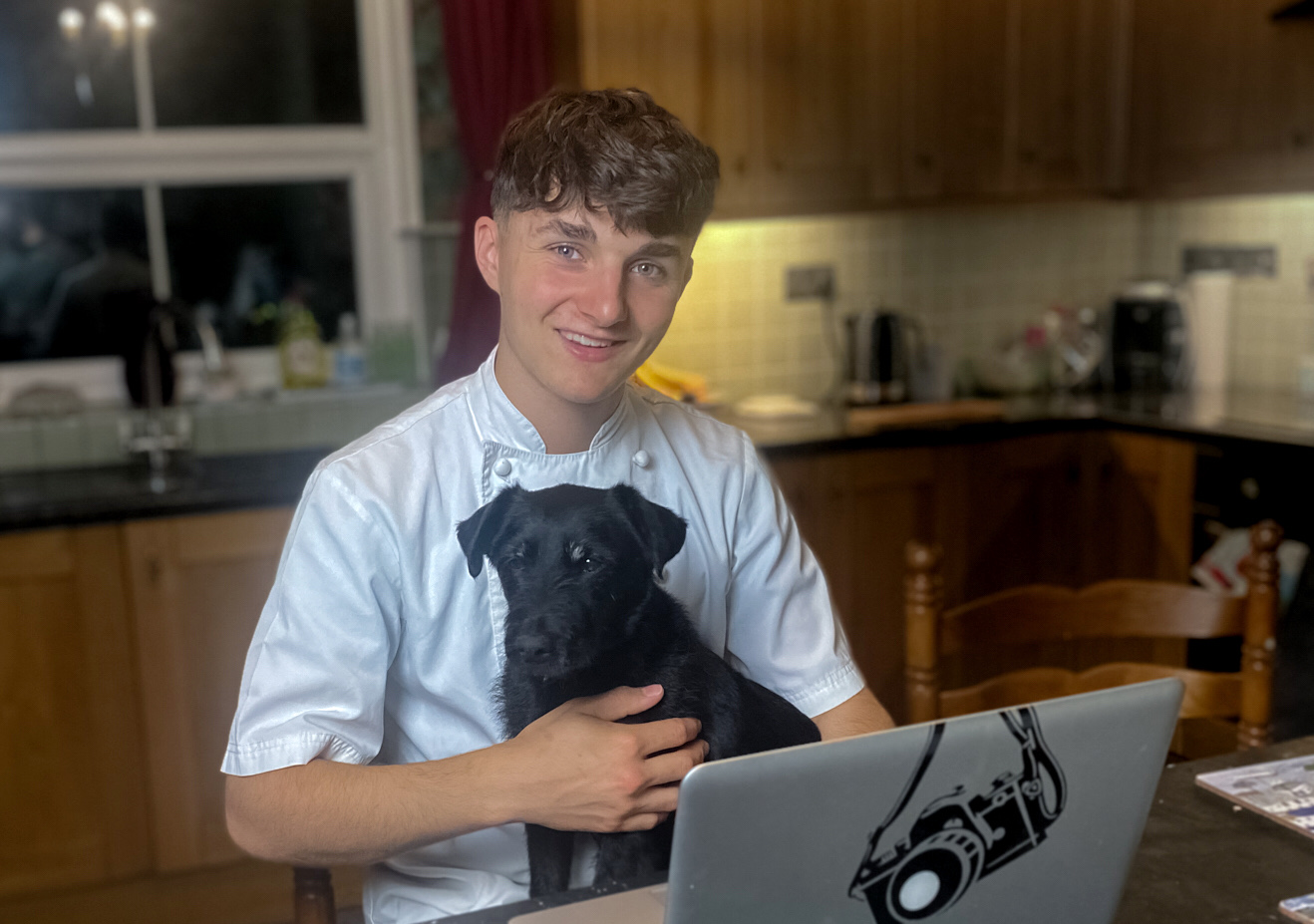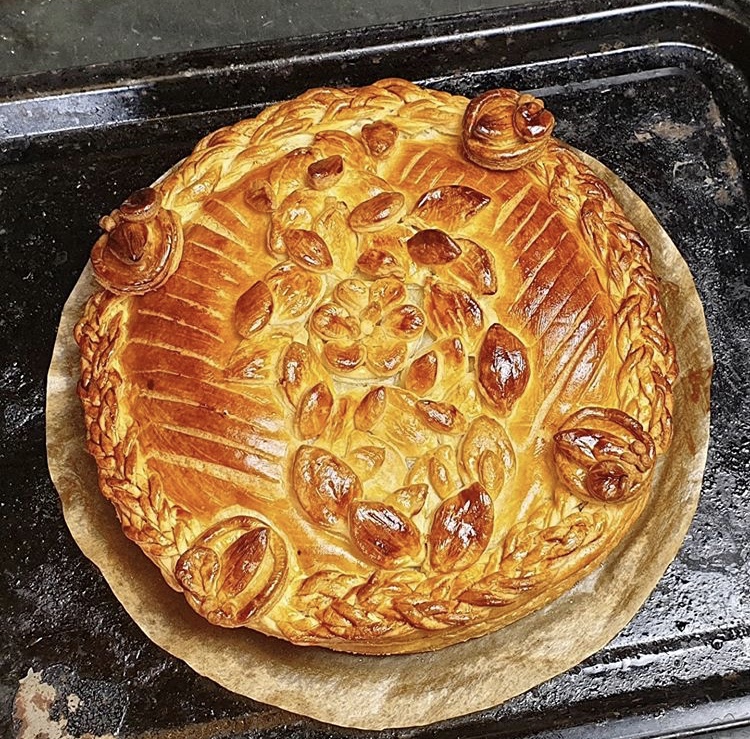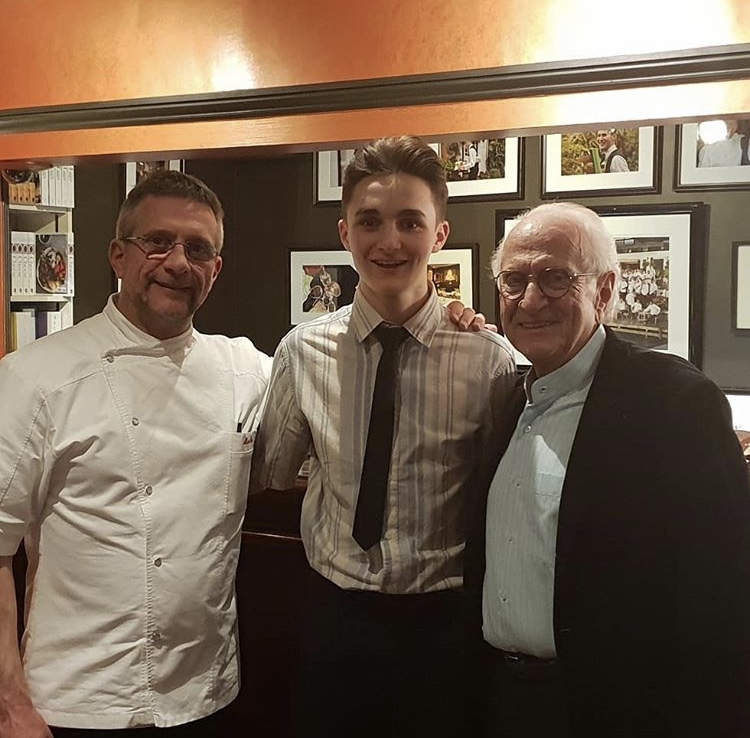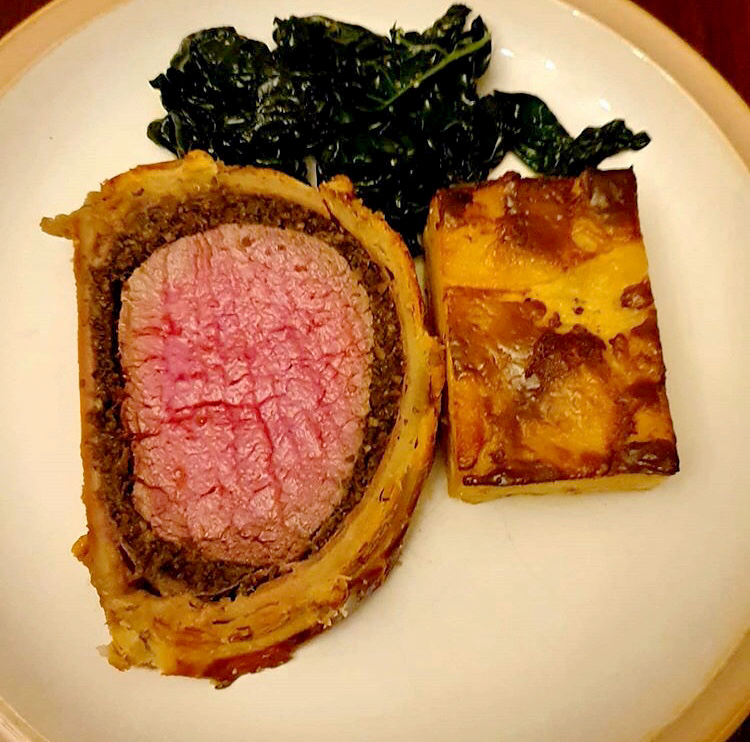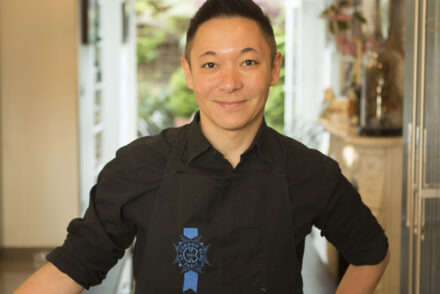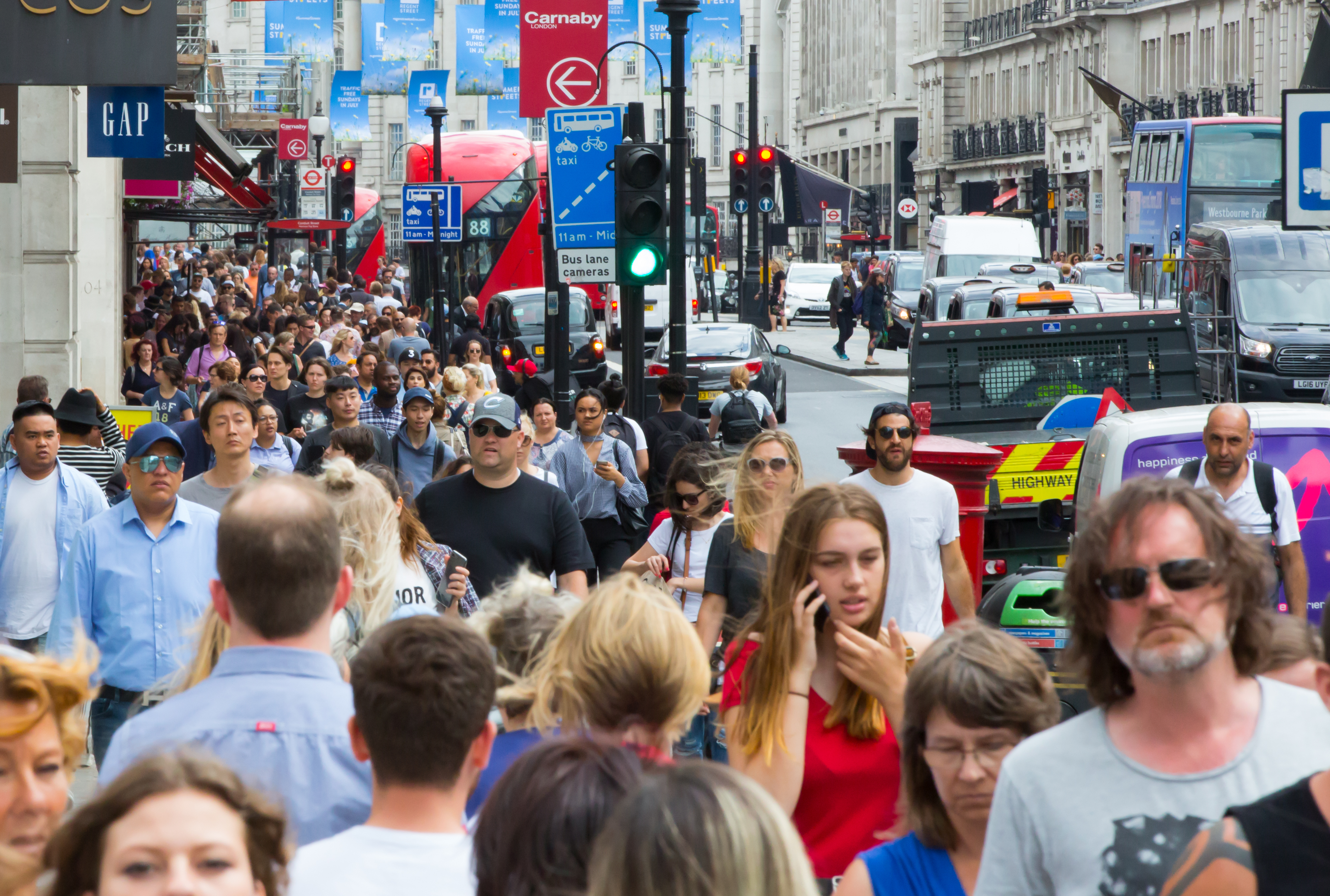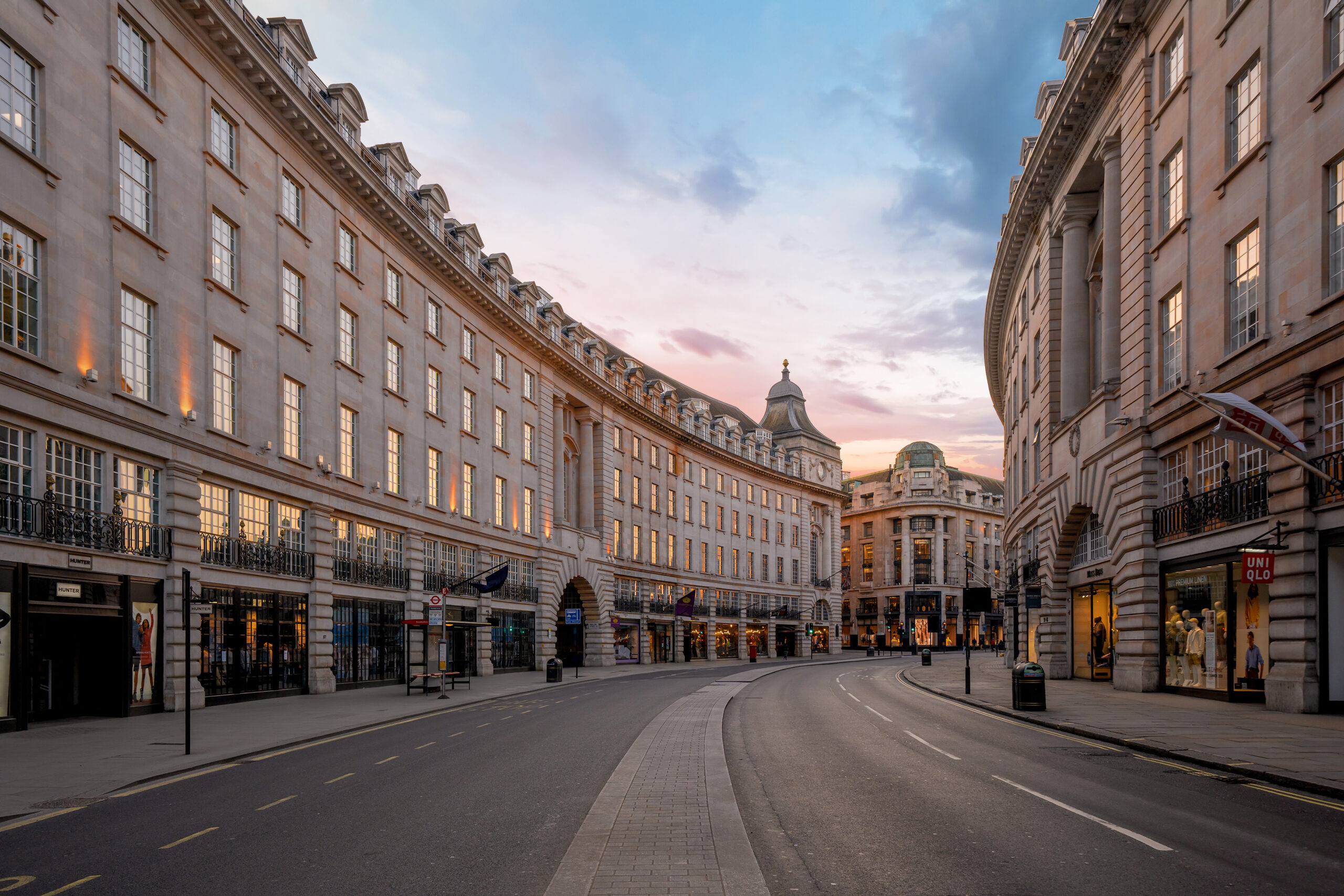Daniel Adams is an up-and-coming chef, food writer and philanthropist who has already worked for Marcus Wareing, Heston Blumenthal’s The Fat Duck and Paul Ainsworth at No.6 amongst others. He is passionate about the science behind food as well as the need for healthy eating and sustainability. Palate’s editor J A Smith (JS) caught up with Daniel (DA) over a Zoom call…
JS: How was your lockdown?
DA: Everybody had their difficulties really – me included. It’s a big change going from 65 hours a week in a Michelin-starred restaurant to just being at home all the time. But I’ve made use of the time. I’ve been writing recipes and cooking every day. I’ve set up a little vegetable patch outside – I didn’t grow any vegetables but I succeeded with some herbs, so I’m happy with that – and I’ve been helping my dad on his boat as well, which has been quite interesting as I’ve learnt some boat skills.
JS: So did you move back to your parents then?
DA: Yeah, my father in Cornwall. He lives here.
JS: How’s that been?
DA: It’s actually brought us closer together. My parents are separated and growing up I just lived with my mum, so before I didn’t really have a strong relationship with my father. Moving down here from London and spending time with my father has brought us closer together. He’s learnt more about me, I’ve learnt more about him. And he uses me as the house chef, not that I mind!
JS: Understandably we’ve all been pre-occupied by Covid-19 and how it’s changed all our lives, but we haven’t really considered the role of food in preventing the spread of the virus and maintaining a healthy diet. What’s your view on that?
DA: Well I think the most important thing to consider is that food is medicine. It’s not that food is like medicine, it actually is medicine. What you put into your body powers your body. So if you’re eating crap – whether during lockdown or whenever in your life – you’re going to feel crap. Good food makes you feel good! And you’re less likely to get ill. Now we’re wearing masks all the time to prevent catching coronavirus but we’re not really thinking about how we can boost our immune systems through eating healthy food. So I think people need to start eating organic, high-quality, free-range food which benefits the body. If you look at doughnuts, biscuits, whatever snacks you like – most of these contain preservatives which don’t do any good for the body. They do bad or they do nothing. So I think it’s really important for people now more than ever to start eating more healthily, looking into what we’re eating and buying locally-sourced food.
JS: In your neck of the woods you’re quite lucky to have a lot of famous chefs on your doorstep – Rick Stein, Nathan Outlaw, Paul Ainsworth to name but a few. Have any of them had an influence on you?
DA: They’ve definitely had an influence on me in the local area during lockdown. Both Paul Ainsworth and Rick’s son Jack were making food for the vulnerable people in Padstow (where I live), so it’s been really nice seeing chefs helping out in the community. I was helping out a little bit, baking something every couple of days and dropping off some food at my grandparents. They weren’t able to go out at all, so we were also doing shopping for them – going round the supermarket with three trolleys! Fortunately they can get deliveries now.
JS: Just before lockdown you were working at Marcus. We’ve had the pleasure of meeting Marcus Wareing a couple of times as customers but what’s it like working for him on the other side of the pass, and in such a renowned restaurant?
DA: He has very high standards. He likes to make sure everything’s perfect and he’s very disciplined. Working for someone disciplined sort of shapes you as a person to be disciplined yourself. It’s hard to explain really. It depends on your personality as well. When you have a disciplined boss and you have a certain mind-set that allows you to focus, then you can go really far as you can grow that way. Marcus is a very good boss and he’s established an amazing restaurant which has been in the Berkeley Hotel for 12, 13 years. As you know, a lot of restaurants have closed down due to coronavirus but his is re-opening soon so he’s obviously doing something right. As with all chefs they have tempers but I think that’s important in a kitchen. You need a level of discipline to be able to control the environment. Without it then you’re not going to get very far in terms of Michelin stars and high standards and that sort of thing.
JS: You’ve also done a stage with Heston Blumenthal at The Fat Duck. Do you identify more with Heston’s molecular gastronomy or more Marcus’ classical French cookery?
DA: I’d class myself somewhere in the middle. When I cook at home I like cooking with traditional French or English techniques – like cooking a piece of chicken in a pan from start to finish. I don’t have a sous vide machine at home (I used to but not anymore). But I find the science behind cooking and food really fascinating. I like to know why the chicken caramelises. What temperature does it need to be when it comes out of the pan and how many more degrees it will warm up by when it’s resting – stuff like that. I like to know why something’s happening. Which goes back to what I was saying about why I think it’s important people understand why we should be eating healthily. Heston has a great saying: “question everything.” And I follow that.
JS: How did you get into cooking? What attracted you to it?
DA: I think it was a variety of things. I don’t think there was a certain moment where I thought “I want to be a chef.” I really enjoyed my cooking lessons at school. Heston definitely inspired me too, even before I did work experience at his restaurant. He did a TV show called Heston’s Fantastical Food – I remember a particular episode where he created a huge cup of tea with a huge biscuit and I just thought it was out of this world. Just something no-one else would do other than Heston, and that idea of doing something a bit different and making people happy intrigued me. That’s what fine dining is all about really – doing something different and making people happy. My aunt also has two restaurants in Marble Arch. When I was much younger I worked front of house but occasionally I’d help out in the kitchen, cutting some vegetables or whatever, and I just loved watching the chefs in there (and sampling the food of course), so it was a mixture of all of that really. I was only 15 when I started working at Marcus, when I was still at school. I did a day of work experience once a week and the head chef (Mark) asked me if I’d be interested in doing a Saturday job there in the summer holidays. I ended up working a full week: Monday to Friday at school, Saturdays at Marcus and Sundays at my aunt’s restaurant. I did my homework on the Tube journeys in between! After my GCSEs, Mark asked me if I wanted to work at Marcus full time and I said “yeah!” But I also felt like I needed to continue in education so I spent 18 months at Westminster Kingsway College doing a catering course and since that finished I’ve been at Marcus full time. Well, until lockdown…
JS: So it seems that cooking and hospitality are very much in your DNA. I think during lockdown people found they had to cook for themselves for the first time and a lot of people struggled with that. What tips do you have for the novice cook?
DA: My tips would be, when you’re starting with the basics – and by the basics I mean one pan dishes, like a hot pot or a beef stew or something – just do something which is easily controllable. That minimises washing up too (when I cook I empty all the cupboards which my dad doesn’t like). Websites like the BBC Good Food site are really useful for beginners. And there are brilliant cookery programmes on TV and YouTube. There are some fantastic chefs: James Martin, Jamie Oliver, etc. They’re all very good at showing the techniques. Watching someone else do it can be a lot more helpful than reading a cook book. It’s all about doing it and seeing someone else do it.
JS: Do you have a signature dish?
DA: Ha ha, I don’t think I do, though my dad thinks it’s Beef Wellington. I try and do something different so I’m always learning as well and use new techniques. But if I was cooking a fancy meal I’d do a Beef Wellington, using some nice local beef.
JS: That sounds delicious! I’ll have to try it some time. Do you have any ambitions to run your own restaurant one day?
DA: Yes! Well, hopefully, in Cornwall. That would be ideal really. Just because we have everything so close by. There’s an organic dairy farm round the corner, we’ve got fantastic vegetable suppliers down here, there’s the sea of course. It’s definitely a good place for a restaurant to focus on sustainability and healthy, organic and natural food. That would be the basis I want to run my restaurant on. I don’t want it to be totally about art and Michelin ambitions. I want to aim for 3 stars of course but I want the meal itself to be nourishing for the customer and an enjoyable healthy experience with everything from the local area. It’s usually sunny here too (not today though). It would be by the sea. Maybe on an island, who knows!
JS: Speaking of islands, I’ve got a desert island question for you! Imagine you’re on a desert island and you’re only allowed one luxury ingredient (in addition to the island’s natural resources), one cooking utensil and, say, three pieces of music. What do you choose?
DA: Cooking utensil would probably be a thermometer. The luxury ingredient would be a big pot of black truffles. And for the music… let me think. I’d probably pick three tracks on my Spotify I like at the moment: ‘In This Shirt’ by The Irrepressibles, ‘Alaska’ by Maggie Rogers and my final one would be ‘On Hold’ by The xx.
JS: I’ll have to check out those tracks – thanks for the suggestions.
DA: They’re all good songs, yep.
JS: It was a pleasure chatting with you Daniel.
This interview took place in August 2020. You can follow Daniel’s culinary adventures on his Instagram page at chefdanieladams.
Photos kindly provided by Daniel Adams.

